Lagos chokes on its own waste: Flood crisis a tale of neglect, corruption and environmental degradation
Lagos, Nigeria’s largest city and one of the fastest-growing urban centers in the world, represents both the promise and perils of rapid urbanization. With a growing population exceeding 14 million, Lagos is a vibrant melting pot of cultures, businesses, and opportunities. However, this sprawling metropolis is also faced with significant urbanization challenges, inadequate infrastructure, and the relentless impacts of climate change.
By Collins Odigie Ojiehanor
One of the most pressing issues is the recurrent and often devastating flooding that plagues the city, particularly during the rainy season. This flooding leaves residents and businesses in a state of perpetual vulnerability, causing widespread disruption and damage.
The root causes of Lagos’s flooding problem are multifaceted and deeply entrenched in the city’s rapid and often unplanned urban development. At the heart of the issue lies the proliferation of illegal structures. Unauthorized buildings and makeshift shops that have mushroomed across Lagos, obstructing natural waterways and drainage channels.
These illegal constructions highlight a broader systemic challenges, the lack of effective urban planning and the weak enforcement of building regulations. As a result, many of the city’s drainage systems are clogged or entirely blocked, rendering them incapable of handling the heavy rains that frequently batter Lagos.
Moreover, some of the city’s drainage infrastructure itself is outdated and insufficient to meet the demands of its ever-growing population. Many of the existing drainage systems were designed decades ago when the city’s population was significantly smaller. These systems have not been adequately upgraded or expanded to accommodate the current urban sprawl.
The inadequate drainage infrastructure is further exacerbated by poor maintenance practices. Regular clearing and desilting of drains are often neglected, leading to their reduced capacity to manage stormwater. Residents dump waste into drainages and this worsens blockages during the rainy season.
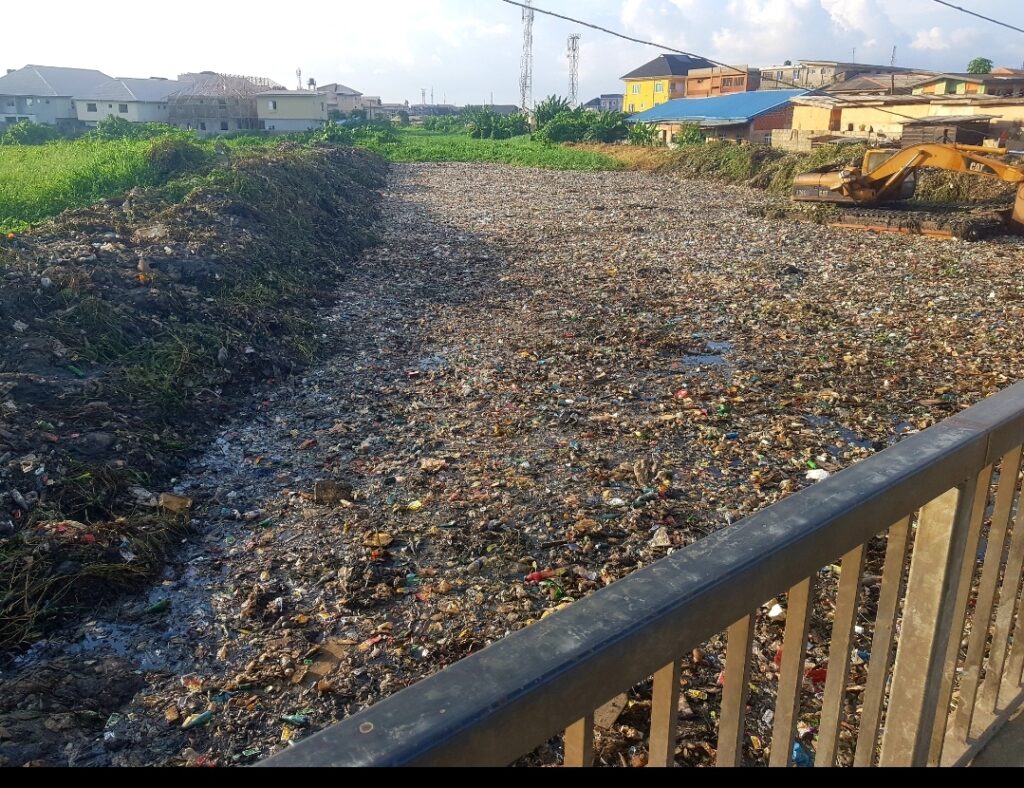
Indiscriminate waste disposal further compounds the flooding problem. In many parts of Lagos, open dumpsites are a common sight due to a lack of proper waste management and a general lack of awareness or indifference to proper waste disposal practices among residents. Waste, often discarded indiscriminately, inevitably finds its way into drainage systems, creating severe blockages.
The Ripple Effects of Flood in Lagos
Situated along the Atlantic coast, Lagos faces unique challenges exacerbated by rapid urbanization, inadequate infrastructure, and the relentless impacts of climate change. The impacts of flooding in Lagos are far-reaching. Residential areas, particularly those in low-lying regions, are the hardest hit. Homes are frequently inundated during the rainy season, resulting in significant property damage and the displacement of residents.
The consequences extend beyond material loss; stagnant floodwaters become breeding grounds for mosquitoes, escalating the risk of malaria and other waterborne diseases among the population. Additionally, the floodwaters often contaminate drinking water sources, posing further health risks. This public health threat compounds existing challenges in healthcare delivery, further straining local resources.
Businesses, especially those in busy market areas of Lagos, often suffer severe difficulties during severe floods. Shops and markets often suffer significant losses as goods are damaged or destroyed, and trading activities are disrupted. The economic impact is profound, with millions of naira lost annually due to flood-related damages. These financial setbacks not only affect individual businesses but also impact the broader economy, hindering growth and stability in one of Africa’s key commercial hubs.
Transportation infrastructure in Lagos, already strained by the city’s dense population and rapid growth, becomes severely compromised during floods. Congested roads become impassable, leading to extensive traffic jams and increased accident risks. Public transportation systems, including buses, ferries used in areas like Lagos Island, Ikorodu are disrupted, worsening the daily commute for millions of residents.
Speaking of climate change, Lagos’s coastal location makes it particularly vulnerable to rising sea levels and intensified rainfall associated with global warming. These climatic shifts contribute to more frequent and severe flooding events, amplifying the city’s existing vulnerabilities. Without proactive measures to enhance climate resilience, including improved drainage systems, flood forecasting, and early warning systems, the future outlook for Lagos remains precarious.
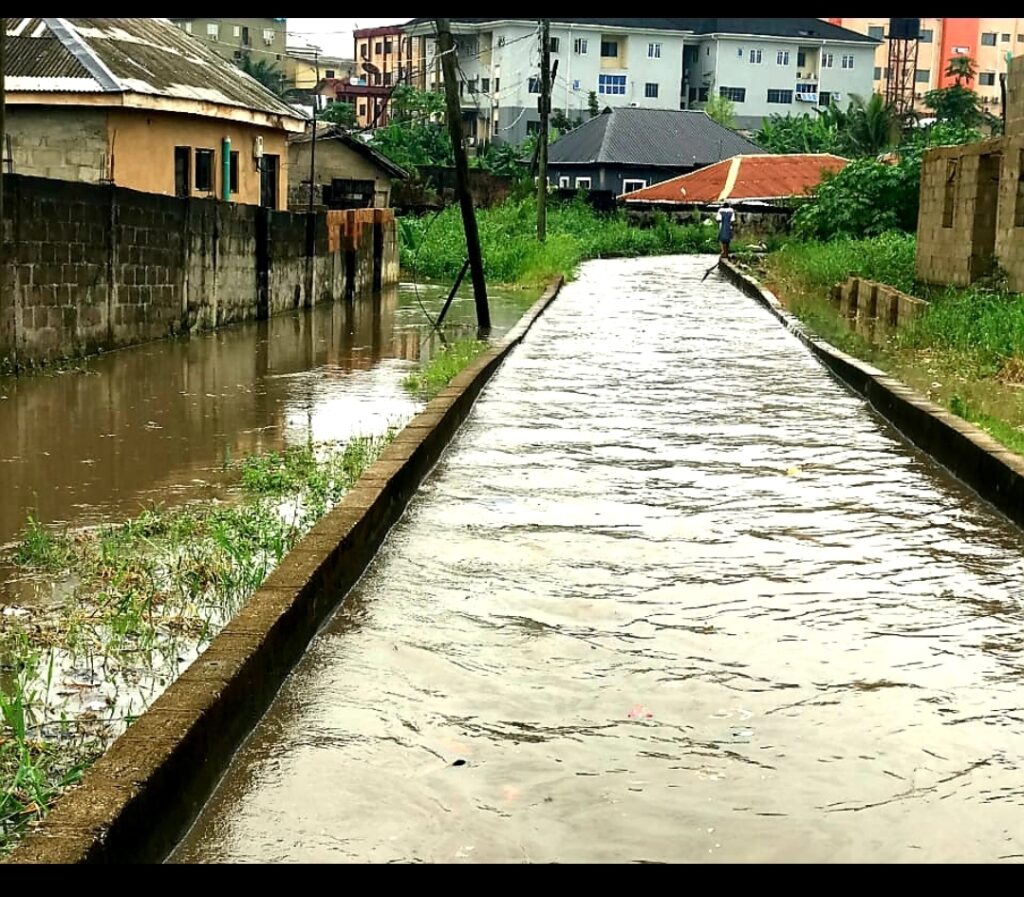
Residents’ Plight, Voice Despair
The heavy rainfall on Wednesday, which lasted several hours, caused widespread flooding across both Lagos Mainland and Lagos Island, disrupting daily activities and leaving residents grappling with the aftermath.
Businesses were forced to close, schools were shut down, and many commuters were stranded as roads became impassable. The flooding not only halted the city’s vibrant economic activities but also left residents grappling with significant personal and financial losses.
Residents’ frustration is palpable and growing over the recent and recurrent flooding situations in Lagos. Mrs. Grace Adebayo, a resident of Gbagada said, “Every time it rains, we live in fear. Our homes get flooded, and we lose our belongings. It’s a nightmare.” Mrs. Adebayo Kareem a resident of Kosofe recalled the chaos during the downpour, “We had to run out of the house. The water was rising so fast, and we could do nothing but watch as it took over all the rooms. It was after the rain we started using buckets to remove water from the rooms”.
Residents took to social media to express their frustrations and share their experiences, painting a vivid picture of the chaos and distress caused by the flooding. X formerly known as Twitter, Facebook, and Instagram were flooded with posts, photos, and videos showing submerged streets, homes, and vehicles.
Hashtags like #DearHR, #LagosFlood, and #SaveOurHomes trended as residents sought to bring attention to their plight. Many posts included pleas for immediate government intervention and better infrastructure to prevent future occurrences.
@iam_m3rcy on X posted: “Dear HR, As I left the house I couldn’t believe the amount of flood that surrounded the area, I struggled to swim and finally hopped into a vehicle only to get stuck in the middle of the flood! As I type this message I think the water is taking me back home.”
Similarly, @firdaouzz posted: “After going through all these rain flood stress (especially in Gbagada), only to get to work and discover our Dear HR has already said we should work from home today. I’m in a state of emergency.”
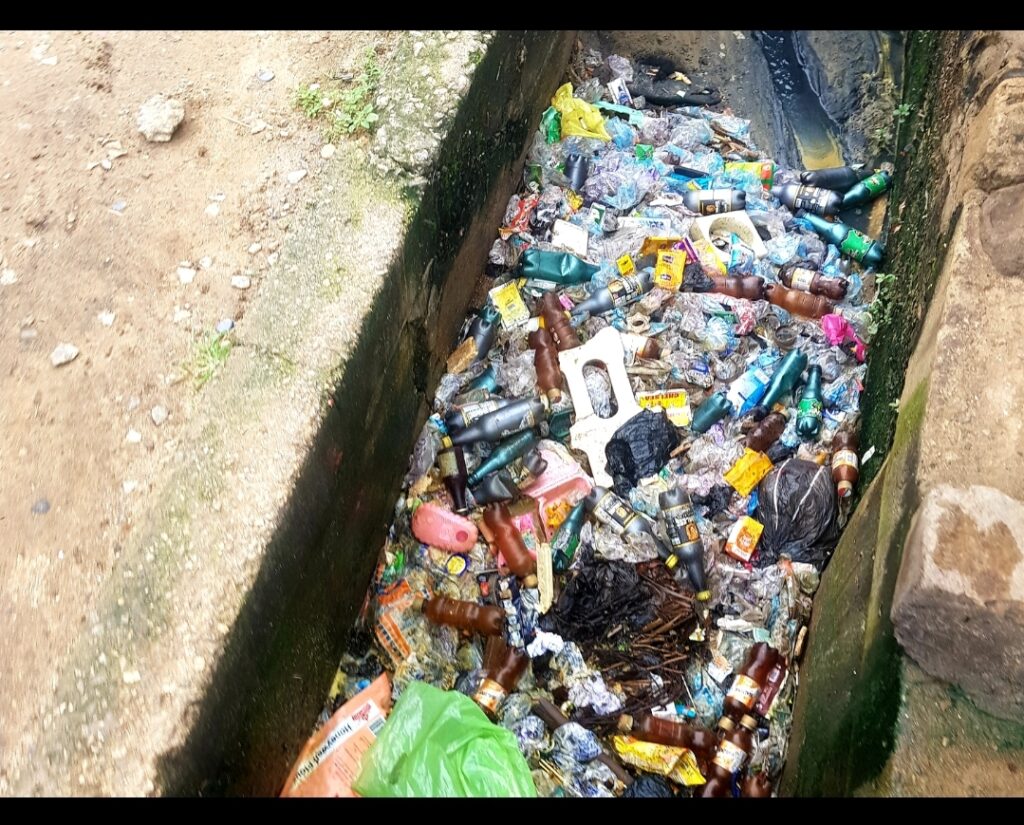
Business Closures and Operational Disruptions
Many businesses in Lagos lack adequate insurance coverage for flood damage, leaving them vulnerable to significant financial losses. The absence of sufficient financial support mechanisms intensifies the economic strain on affected businesses and residents.
The recurrent flooding in Lagos is not just a natural disaster, it is a persistent economic threat to the livelihoods of residents and several businesses. The heavy rainfall and subsequent flooding that swept through the city recently have further highlighted the severe vulnerability of Lagos residents and businesses to extreme weather events.
The economic ecosystem in Lagos is intricate, with small and medium-sized enterprises (SMEs) forming the backbone of the city’s vibrant economy. When flooding occurs, these businesses face substantial disruptions. For instance, the inability to operate for even a few days can lead to significant financial losses, especially for businesses with limited capital reserves. The ripple effects are felt across supply chains, reducing productivity and hampering economic growth.
The economic consequences are vast, affecting a wide array of industries and significantly disrupting daily business operations. Business owner Samuel Olowu a shop owner in Ketu shared that, “The flooding on Wednesday was one of the worst we’ve seen this year. My shop was completely submerged, and I couldn’t open for business for two days.”
Similarly, Mr. Richard Olowu, an occupant in the same shop shared his experience of spending hours saving what he could from their flooded shop. He emphasized that flooding has become a routine challenge, but the recent downpour was particularly severe.
Small business owners like Samuel and Richard Olowu are particularly hard-hit. Their experiences underline the vulnerability of SMEs to flooding. When Samuel’s shop in Ketu was submerged, it wasn’t just a physical space that was affected, his inventory, which represents a significant portion of his working capital, was also at risk.
Richard’s struggle to rescue what he could from the floodwaters highlights the recurring nature of this threat. Each flooding event incurs direct costs for repairs and inventory replacement, as well as indirect costs such as lost business opportunities and diminished customer trust.
For many small businesses, the financial impact of flooding extends beyond the immediate aftermath. Inventory losses and repair costs reduce profit margins, while business closures during peak trading times can lead to a decline in customer loyalty.
The cumulative effect of recurrent flooding can erode the financial stability of small businesses, making it harder for them to recover and thrive in the long term. This financial instability also affects employees, who may face reduced working hours or job losses due to business closures and reduced operational capacity.
Impact on Various Sectors
The retail sector is not alone in facing the brunt of the floods. Other sectors, such as hospitality, manufacturing, and services, also suffer significant losses. Restaurants and eateries often have to dispose of spoiled food due to water damage and electricity outages. Hotels and guest houses might experience cancellations and damage to their premises, leading to costly repairs and lost bookings.
Manufacturing units, particularly those with perishable goods, face severe disruptions as flooding can halt production lines, damage raw materials, and delay delivery schedules. Service-based businesses, including beauty salons, repair shops, and professional services, also endure significant downtimes, leading to a reduction in their client base and overall income.
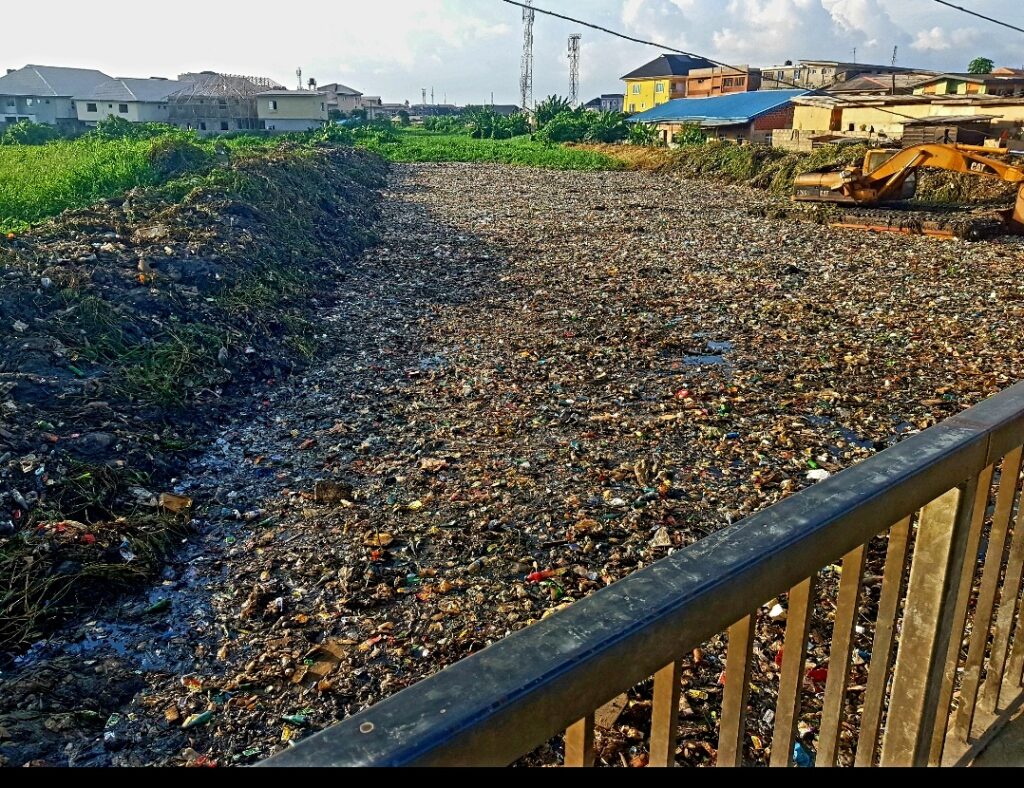
The economic impact of flooding extends to the supply chain and logistics sectors. Flooded roads and impassable routes delay the transportation of goods, causing holdups and shortages. This disruption can lead to increased costs for businesses that rely on timely deliveries, forcing them to find alternative, often more expensive, routes or means of transport.
Furthermore, the overall consumer spending power diminishes during and after flooding events. Residents, dealing with property damage and personal losses, tend to cut back on non-essential expenditures. This reduction in consumer spending further affects local businesses, compounding the economic downturn.
Expert Warn of Environmental Disaster
Environmental experts have warned that illegal structures built on drainage systems and indiscriminate waste disposal are significant contributors to the flooding crisis in Lagos. According to Dr. John Adeoye, an environmental scientist, he emphasized that, “Illegal structures and waste clogging drainage systems are significant contributors to the flooding in Lagos. It is crucial for the government to enforce regulations and for residents to adopt more sustainable waste disposal practices,” he said.
He further explained that the proliferation of illegal structures in Lagos is a direct consequence of unchecked urban extension and ineffective enforcement of building regulations.
He emphasized that “Informal settlements and unauthorized constructions often spring up in vulnerable areas, including along waterways and drainage channels. These structures obstruct natural water flow paths, impeding the drainage of stormwater during periods of heavy rainfall. As a result, even moderate rain events can lead to significant flooding, inundating nearby residential and commercial areas.”
Dr. Adeoye also highlighted how improper waste disposal practices exacerbate drainage blockages and exacerbate flood risks in Lagos. “Many residents dispose of garbage indiscriminately, often directly into drainage channels or open spaces. This debris accumulates over time, forming barriers that hinder the flow of water and contribute to localized flooding. Plastic waste, in particular, poses a persistent challenge due to its non-biodegradable nature and propensity to accumulate in water bodies, worsening drainage issues during the rainy season,” he said.
Speaking on the environmental and health consequences, Dr. Adeoye said “the consequences of flooding extend beyond property damage to encompass broader environmental and health impacts. Stagnant floodwaters become breeding grounds for disease-carrying mosquitoes, heightening the risk of vector-borne diseases such as malaria and dengue fever. Moreover, the contamination of water sources due to flooding compromises drinking water quality, exposing residents to additional health hazards.”
Dr. Adeoye’s call for stronger enforcement of building regulations reflects a broader need for enhanced urban governance and regulatory compliance. Government authorities must enforce zoning laws, stop unauthorized construction activities, and promote sustainable urban development practices that prioritize flood resilience.
Government and Policy Intervention
Effective regulation and enforcement of building codes are essential to curb the proliferation of illegal structures that obstruct drainage systems. Investment in modernized and expanded drainage infrastructure, coupled with regular maintenance and desilting, is crucial to enhance the city’s capacity to manage stormwater runoff.
Furthermore, promoting sustainable waste management practices and raising public awareness about the consequences of indiscriminate waste disposal are imperative steps towards reducing blockages in drainage systems. Community engagement and participation are essential for fostering a culture of resilience and collective responsibility in mitigating flood risks.
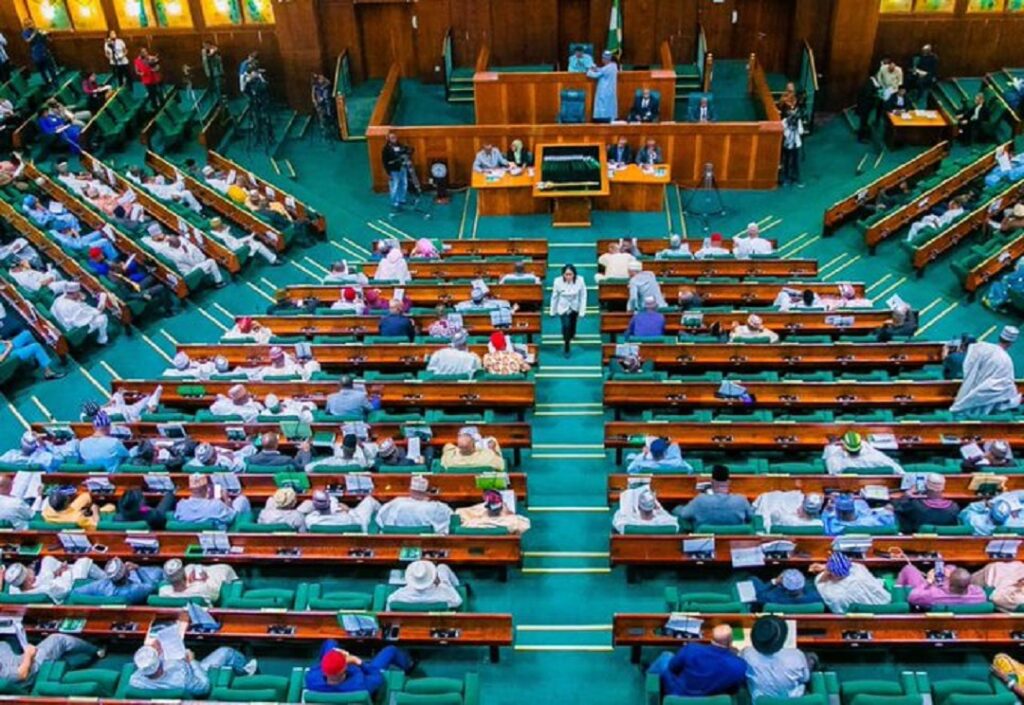
Following the recent flooding that occurred in many parts of Lagos, the Lagos State government has issued a 48-hour vacation notice to property owners with illegal structures and squatters along the Gbagada Bariga Channel.
The vacation notice was announced by the Lagos state Commissioner for the Environment and Water Resources, Tokunbo Wahab, via his official X handle @tokunbo_wahab on Sunday. Wahab explained that the drainage channel, which serves to deflood the Bariga, Gbagada, Sholuyi downstream communities, and other environs, has been blocked by squatters and obstructive structures significantly obstructing free flow of water in the area.
“The drainage channel which defloods Bariga, Gbagada, Sholuyi downstream communities and environs, and discharges into System 1 has been taken over by squatters who has constituted nuisance and security risks to the Estate, and property owners who deliberately built to obstruct free flow of water in the area,” said Wahab.
The commissioner explained that shanties erected along the length of the channel have blocked collectors that are supposed to carry stormwater into the channel, leading to the flooding experienced during the week. “Shanties were erected along the length of the channel and their activities had blocked collectors that are supposed to carry stormwater into the Channel which resulted to the flooding experienced during the week.”
Wahab noted that following the expiration of the eviction notices, the Lagos State Ministry of Environment and Water Resources will begin the removal of the illegal structures to restore proper drainage and mitigate flooding in the area.
“Upon expiration of the notices served, the operatives of Lagos State Ministry of the Environment and Water Resources will commence removal of those contravening structures in order to deflood the area,” Wahab added.
While Lagos continues to thrive as a dynamic center of commerce and culture, its susceptibility to flooding highlights the urgent need for proactive measures and collaborative efforts. By addressing the root causes of flooding and investing in resilient infrastructure and sustainable urban planning, Lagos can mitigate the impacts of future floods and build a more secure and prosperous future for its residents and businesses alike. Moreover, investing in modernized drainage infrastructure and implementing regular maintenance schedules are essential steps to enhance the city’s adaptive capacity to climate change-induced flooding.





Comments